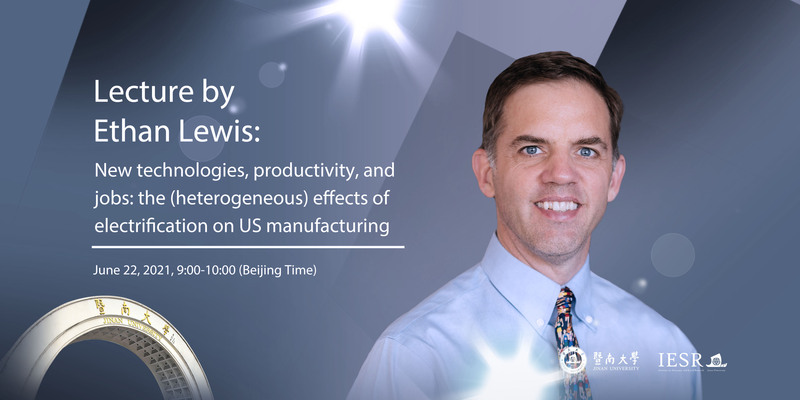Speaker:Ethan Lewis, Dartmouth College
Title:New technologies, productivity, and jobs: the (heterogeneous) effects of electrification on US manufacturing
Time:9:00 - 10:00 (Beijing Time), 22 June, 2021

About the speaker:
Ethan Lewis is a Professor of Economics at Dartmouth College and a Research Associate with the National Bureau of Economic Research. His research investigates how U.S. labor markets adjust to immigration and to technological change, including how employers adapt their production technology to the local availability of immigrant workers. His newest work investigates the impact of U.S. immigration policies, including the Reagan amnesty, and how the US manufacturing sector adapted to electrification. His findings have appeared in top economics journals, including American Economic Review, Quarterly Journal of Economics, Journal of Political Economy, American Economic Journal, and Review of Economics and Statistics. His work has been covered in New York Times, Wall Street Journal,The Economist, Newsweek and other media outlets. Ethan received his Ph.D. in economics from UC Berkeley in 2003.
Abstract:
We use a rich data set at the city-industry level from 1890 to 1940 to identify the impact of electricity on manufacturing industries. We exploit cross-industry variation in energy use intensity before the arrival of electricity combined with geographic variation in proximity to early hydroelectric power plants. Using this approach, we find that labor productivity gains from the arrival of electricity were quite rapid and long-lasting. Electricity induced output growth without corresponding increases in employment. Moreover, electricity induced capital deepening and a hollowing out of the labor skills distribution. We show that electricity's effects vary with the degree of product market structure: in sector-county pairs where the average firm was initially large, we find no significant expansion in employment, while in markets with relatively small firms, both output and employment increased, as expected in competitive markets.


